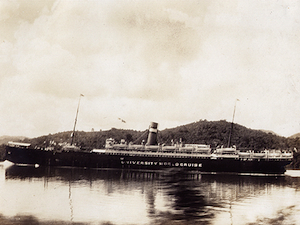 In late September 1926, the SS Ryndam departed Hoboken, New Jersey, on a journey around the world. Dubbed the “Floating University,” she housed about 500 students, representing almost 150 different colleges, and dozens of professors and administrators. Among the world-class faculty were representatives from Clark University and Williams College, the universities of Michigan, Missouri, New York, Texas, Washington, Turin, and Vienna, and the former governor of Kansas. Almost one third of the students were freshmen, who would earn “[f]ull credit for courses passed” when they returned “to stationary education.” The brainchild of New York University psychology professor James Lough, the charmingly-named “University World Cruise” “visited 35 countries and more than 90 cities,” from Shanghai to Oslo, before returning in May 1927. A precursor of modern study abroad programs, the cruise marked a turning point in the globalization of American education. The goal, as Lough put it, was “to train students to think in world terms.” Within months of its return, educators started formulating a floating high school to supplement the curriculum.
In late September 1926, the SS Ryndam departed Hoboken, New Jersey, on a journey around the world. Dubbed the “Floating University,” she housed about 500 students, representing almost 150 different colleges, and dozens of professors and administrators. Among the world-class faculty were representatives from Clark University and Williams College, the universities of Michigan, Missouri, New York, Texas, Washington, Turin, and Vienna, and the former governor of Kansas. Almost one third of the students were freshmen, who would earn “[f]ull credit for courses passed” when they returned “to stationary education.” The brainchild of New York University psychology professor James Lough, the charmingly-named “University World Cruise” “visited 35 countries and more than 90 cities,” from Shanghai to Oslo, before returning in May 1927. A precursor of modern study abroad programs, the cruise marked a turning point in the globalization of American education. The goal, as Lough put it, was “to train students to think in world terms.” Within months of its return, educators started formulating a floating high school to supplement the curriculum.
The new Floating University, launched in Fall 2011, does not literally float, but it is no less ambitious. Its signature course, entitled “Great Big Ideas,” purports to offer “the key takeaways of an entire undergraduate education.” In a series of twelve video lectures, students receive “a survey of twelve major fields delivered by their most important thinkers and practitioners.” Topics range from physics to philosophy and feature an all-star cast of instructors from Columbia, Harvard, Yale, and the University of Chicago. Lawrence Summers, the former president of Harvard, offers his thoughts on education. Dean of Yale Admissions Jeffrey Brenzel recommends his “Top 10 Classics” in high definition video “featuring Hollywood production values.” There is even a lecture on investment strategy by superstar hedge fund manager William Ackman. Students at Harvard, Yale, and Bard College can enroll in the course for credit. Others can buy a six-month subscription for the low, low price of $199 (Ackman’s video, “Who Wants to Be a Billionaire?” is available in “enhanced stand-alone format” for $59.99).
Unlike the original Floating University, this most recent iteration has only one course and is not focused on world experience. Instead, it brings the world to you. Although students taking the course for credit meet in person for a weekly seminar, for the most part it is an experiment in structured independent learning. The motive force behind this latest floater is not a professor. Rather, it is real estate mogul Adam Glick. The university is, in fact, a for-profit venture of Glick’s Jack Parker Corporation and Big Think (a website that aggregates what it deems “the most important ideas” of today). While James Lough dreamed of educating global citizens, Glick’s concerns are much more prosaic. “[I]n my business, I was having difficulty hiring generalists,” he said in an interview last year. “Most people had graduated college in the silos of particular majors. They were very, very smart, but didn’t have a lot of perspective.”
I have mixed feelings about Glick’s university. On the one hand, it embodies a collaborative, interdisciplinary spirit that is in great demand these days. Despite the hype, it does make important topics and world-class intellectuals available to almost anyone. Certainly, its broad scope and accessible format will encourage students “to think in world terms.” On the other hand, I am skeptical of running essential public services (such as higher education) as for-profit industries.  The inclusion of hedge fund manager Ackman, for example, smacks of a tacky infomercial. There are digital alternatives that offer similar content for no cost whatsoever. Academic Earth, to which Yale contributes, hosts dozens of world-class courses, including a blockbuster series on the Civil War by my adviser. (Learn about the election of 1860 while munching a bowl of popcorn; ponder the shortcomings of the Freedmen’s Bureau while waiting for the bus!) The famous Khan Academy offers a plethora of lectures and tutorials that are like watching a filmed version of Wikipedia. Of course, as every digital humanist knows, “lectures are bullshit.”
The inclusion of hedge fund manager Ackman, for example, smacks of a tacky infomercial. There are digital alternatives that offer similar content for no cost whatsoever. Academic Earth, to which Yale contributes, hosts dozens of world-class courses, including a blockbuster series on the Civil War by my adviser. (Learn about the election of 1860 while munching a bowl of popcorn; ponder the shortcomings of the Freedmen’s Bureau while waiting for the bus!) The famous Khan Academy offers a plethora of lectures and tutorials that are like watching a filmed version of Wikipedia. Of course, as every digital humanist knows, “lectures are bullshit.”
Perhaps the most troubling oddity about “Great Big Ideas” is that it has no content in history. Zero. Zilch. Nada. Nothing. Not even close. Is history not a “major field” with “important thinkers?” Even more baffling, history instruction provides exactly the kind of big-picture-oriented, theoretically-grounded, interdisciplinary knowledge to which “Big Ideas” aspires. History is a discipline of disciplines; in their attempts to make sense of the past, historians draw on anthropology, archeology, computer science, demography, economics, film studies, geography, linguistics, literature, musicology, philosophy, physical and natural science, psychology, social theory, and statistics.
History is a vast laboratory of humanity; it illuminates the present by tracing the trajectories of the past. It is, as Robert Penn Warren put it, “always a rebuke to the present.” It tells us that the original Floating University had difficulty raising funds after its maiden voyage, and that it floundered in the wake of the 1929 market crash. If the new Floating University is to avoid a similar fate, it might do with a lesson in history.